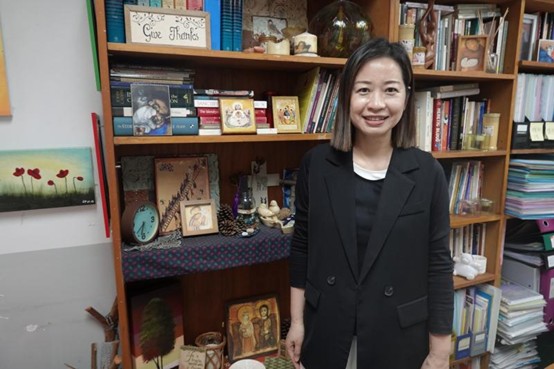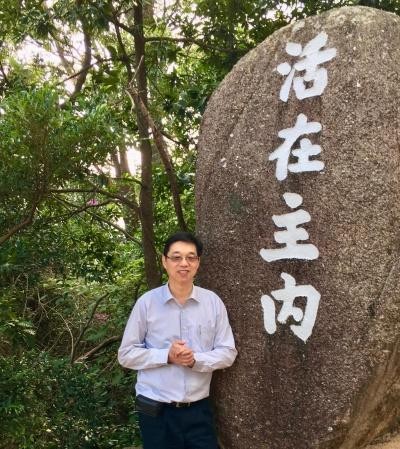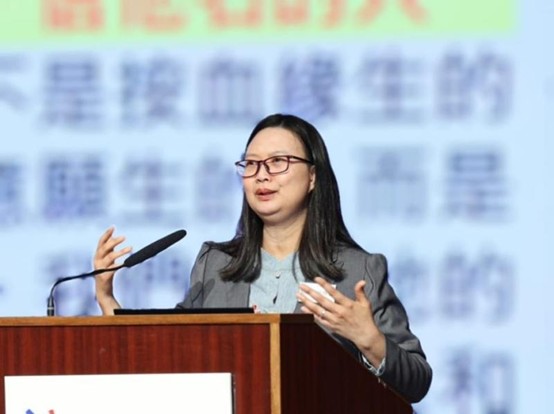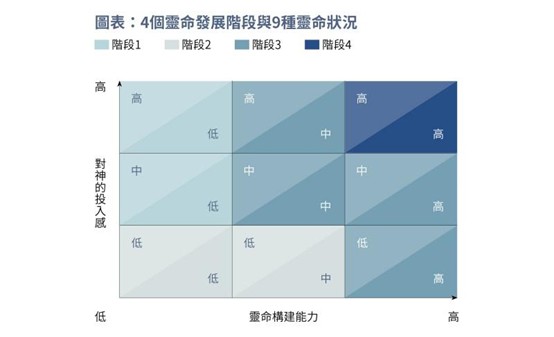Interview and Cover Feature Article by Christian Times (4 May 2025)
We are grateful to the Christian Times for inviting us for an interview, and we thank the Lord for giving Dr Candy Yeung the opportunity to share in the feature article about the Spiritual Guidance Model and the role and effectiveness of the Spiritual Thermometer Ministry in spiritual direction. This cover article was published in the Christian Times Issue 1966, 4 May 2025, and we are grateful for the permission to reproduce it in its entirety, which is available in Chinese only.
Seeking Spiritual Direction in the Midst of Disillusionment: Spiritual Awakening of the Believers Pastoral Renewal of the Church Interview: Donna Mak / 2 May 2025
Comments made by Dr Candy Yeung related to SG Model is translated below for easy reference.
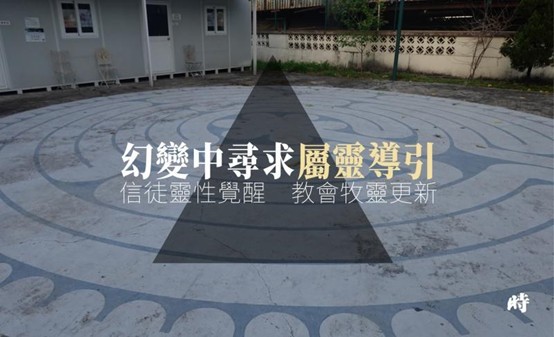
近年來,面對著世代急速的變化、個人創傷,不少教牧信徒開始重視靈修,以至尋求屬靈導引(或稱靈修指導)──透過與屬靈導師傾談,尋索神在此時此地的心意。有提供屬靈導引的機構指出,愈來愈多信徒教牧尋求他們的服務,反映信徒的靈性覺醒。有機構成立屬靈導引資源中心回應需要;亦有信徒整合靈命塑造、靈修指導、基督教輔導、心理學,創立一套以聖經為基礎的「屬靈引導模式」,幫助弟兄姊妹檢測其靈命狀況。
然而,靈修不只是個人的事,亦涉及教會牧靈方式的更新。教會除了以教導式牧養為本外,能否透過屬靈導引,更重視信徒的「所是」(being)?
甚麼是屬靈導引?
Spiritual direction,中文多譯作靈修指導、靈修導引、屬靈導引,意思是引導人理解上帝在其生命中的旨意,並與祂建立密切的關係。天主教會譯作靈修輔導,可解作屬靈上神與人之間的關係輔導。
屬靈導引是一種歷史悠久的牧靈方式,雛形始於第三至四世紀,當時修道運動興起,隱修者為追求靈性成長,拜訪在靈修方面久歷磨煉的沙漠教父和教母,尋求親密關係的靈修指導。
今天的屬靈導引多透過一對一傾談進行,由靈修導師幫助受導者敏銳及明白神的作為,並鼓勵以行動回應神。屬靈導引不等於心理輔導,後者主要目標是幫助受導者面對情緒困擾和不安,尋求解決方法;屬靈導引則幫助受導者在平凡的生活中覺察上帝的臨在及作出積極回應,非以解決危機或問題為目的。現時不同基督教機構均有提供屬靈導引的服務,而每個機構或靈修導師所採用的導引方式亦不盡相同。
(資料來源:受訪內容、道風山基督教叢林90週年靈修講座陳誠東牧師解說、中國宣道神學院176期通訊賴玉芳文章〈屬靈導引:在神親自的導引中作導引〉)
牧者信徒背負沉重壓力
雯雯是一位信主近30年的信徒,3年前因疫情及好友移民,引發抑鬱焦慮症,感受到生命裡有很多恐懼與不安,亦發現自己從主接收的愛不足以抵禦各種轉變帶來的壓力,於是期望藉著屬靈導引,更新屬靈生命。多次面見靈修導師後,她覺察到上主的慈愛是衝破患難和前行的原動力,使她更安心靠主,「逐步由靠藥物和靠己力作戰,轉為更單純倚靠上主」,讓她內心變得輕省,漸漸踏上復元之路。
另兩位40多歲、剛升任教會堂主任的牧者,背負著繁重的教會事工。一位要看顧一對年老父母;另一位則是單親媽媽,丈夫兩年前因癌症病逝,要照顧一對年幼子女。他們在導師陪伴下,得以看見上主的臨在。縱然面對種種挑戰,但卻沒有動搖他們對神的信靠。他們在安靜禱告中坦誠開放自己向主傾訴,被主的回應安慰和鼓勵,成為他們繼續事奉的力量。
上述是中國宣道神學院「個人屬靈導引服侍計劃」的受導者及導師所遇的情況,可見今天教牧信徒面對不少壓力:牧者背負著繁重的教會工作、信徒覺得難以單靠信仰的力量應付轉變。
巨變下教會覺醒應倚靠神
中國宣道神學院靈修神學講師賴玉芳與該院屬靈導引碩士課程的導師及畢業生,在過去7年觀察到香港社會經歷巨變,人感到焦慮不安,覺得無法掌控未來;亦有教會牧者移民、信徒流失,令牧養和教會發展變得困難,遂在今年2月成立「基督教屬靈導引與資源中心」(下稱中心)。賴玉芳指,受動盪的社會局勢影響,香港教會開始重視靈修和退修,有了一種學習倚靠神的覺醒:「信仰可以經營下去,不是靠努力,而是學習安息在上帝的懷中。」她說:「傳統的模式,如個人的裝備和屬靈成長,都是靠讀(聖經)……惟有個人的靈性操練才能幫助他成長。」
她引用中國宣道神學院2023年「個人屬靈導引服侍計劃」的數據,指計劃有逾100人報名,最後服侍了79人,過程中共提供600多次約見服務;參與者有55%為牧者和宣教士,其餘是信徒。數字反映愈來愈多弟兄姊妹渴望尋求屬靈導引,對靈修更有興趣。
The founder of the Christian organization ‘Spiritual Guidance Model/ Spiritual Thermometer’, Dr Candy Yeung, started the organization in 2022, and from April last year to March this year, it had served more than 1,000 people, which is a two-fold increase compared to the previous year. Dr Yeung believes that the reason for this is due to the fact that believers and pastors are faced with interpersonal problems, personal traumas, and unexpected challenges within the church. At the same time, due to rapid social, economic and cultural changes, the outbreak of war, and the emergence of AI, interpersonal relationships have become weaker and more anxious, and more people are eager to seek God's heart and grow closer to Him.
提供靈修指導服務的道風山基督教叢林,該機構的靈修部主任陳誠東牧師指,2021及2022年分別進行逾670人次面見,2023年增加至781人次;到2024年,估計因該機構的靈修班減少才回落至429人次。當中8成是靈修課程或退修營的參與者,餘下的是在網上或致電預約;有一半是牧者或宣教士,一半是信徒。此外,該機構正督導的20多位靈修導師,在機構以外進行約800次面見,為數不少。
在社會動盪之際,陳誠東指有信徒會選擇尋求靈修指導。例如早幾年社會運動期間,有神學生在堂會實習,因會眾立場不同,不知如何牧養,亦對事奉感到恐懼。後來該神學生尋求靈修指導,導師則引導他反思上帝讓他處身於那環境的心意。及後移民潮湧現,教牧更著重神的心意,遂尋求靈修指導。
冀改變教導為主的牧養觀念
面對信徒教牧追求靈命更新的需要,賴玉芳創辦的中心決定未來舉辦更多靈修講座、提供個人屬靈導引服務,例如開展過往少見的男士靈修事工,及著重青年靈性培育等個人服侍。
在教會方面,該中心亦會舉辦「教會靈性培育事工」先導計劃,藉著為期3年的計劃,邀請10間教會作「種子教會」,每間教會派出1位牧者及3至4位核心成員組成「種子團隊」,率先體驗屬靈導引。團隊會透過「小組靈修交談」(spiritual conversation),在屬靈導師帶領下,彼此聆聽與同行,並在其中發現上帝足跡。最後計劃會鼓勵團隊將屬靈導引元素帶回教會牧養中,期望藉著屬靈導引改變過往側重於教導的牧養觀念。
賴玉芳解釋,香港教會著重教導式的牧養,例如重視學習聖經知識,彷彿將上帝知識化、工具化、物化,形成「我與它」關係(I-It relationship),著重「所行」(doing),而忽略人生命的「所是」(being);而屬靈導引能擴闊視域,強調神與人「我與你」的關係(I-Thou relationship),幫助信徒與神建立密切關係。她強調屬靈導引不是事工,而是一種牧靈方式,是關乎信徒的靈命、人與上帝的關係、神觀的改變,「這亦應是教會眾多事工的主軸」。她指教會較多以講道、團契、主日學、短宣、奉獻牧養,若要轉為導引式的牧養,還需要時間改變根深柢固的教會文化,但相信上帝有其時間。
Believers Create Spiritual Tools to Measure Spiritual Condition
She introduced that the SG Model has two major dimensions: ‘Spiritual Commitment ,i.e. Commitment to God’ and ‘Spiritual Competency, i.e. Ability to Construct Spiritual Life’, based on different ratios to form different ‘Spiritual Development Stages’ (SDS). The combined ratio of ‘Spiritual Commitment ’ and ‘Spiritual Competency ’ can be expressed as 4 ‘Spiritual Development Stages’, and each element is further divided into high, medium and low ratios, resulting in 9 spiritual conditions (see the chart below). Stage 1 is usually very enthusiastic; Stage 2 is not hopeful or even hopeless; Stage 3 is capable but still hesitant; and Stage 4 is self-independent and able to take charge of one's own life.
SG Model users can fill in the ‘Spiritual Immunity Status Checklist’ to detect which ‘spiritual development stage’ they are currently in, and the tool also suggests corresponding supportive behaviours and guiding actions, such as reading the Bible, attending retreats, and so on. The tool also suggests corresponding supportive behaviours and facilitative actions, such as reading the Bible, attending retreats, etc. Candy Yeung also encourages SG Model users to seek further guidance from spiritual teachers.
教會少將焦點放在牧靈
在動盪的社會局勢中,賴玉芳相信,屬靈導引有其重要性:去幫助人發現生命中上帝的臨在,使人在不確定的未來重拾對上帝的信賴,學習真正的安息。「神會親自引導人的生命。」她又引用天主教已故教宗方濟各的話,鼓勵信徒要為時代活出蛻變,並且尋問主的心意。
在今天變化急速的社會,陳誠東認為,深化與主的關係很重要,需要以主為中心,而非以聚會、信徒關係為中心。對於牧者,陳誠東引用畢德生(Eugene Peterson)的說法,鼓勵牧者要讀經、祈禱、尋求靈修導引。他舉例,若牧者能跟會眾分享在動盪之際的掙扎,如怎樣面對家人移民,這會對牧養帶來很大幫助。「但現實卻不能,(有些牧者)只說一些表面原因,然後下個月就消失(移民)。」
陳誠東指,信徒或多或少期望牧者能帶領靈修指導,他引用道在人間靈修、輔導、文化中心主任陳國權牧師的《身份之重尋——教牧靈修學探研》,指牧者的身份在不同時代皆會轉變,在舊約時期是祭司,到宗教改革時期是講道者,而今天就是屬靈導師,負責引導信徒到主面前。他認為教會需要在靈性培育上幫助信徒,只是多做或少做的分別。陳誠東建議教會可先培育靈修導師,之後可由小做起,舉辦靈修小組或靈修班,吸引有興趣的人,安排他們面見靈修導師,進行靈修指導,有部份人便能進深學習。他舉例有些教會設輔導室或中心,亦有輔導員及信徒學習靈修指導,希望同時提供輔導及靈修指導服務。
However, Candy Yeung sees difficulties in promoting spiritual direction in Hong Kong churches. She quoted the Rev. Dr Liu Ping-tong, Vice President (Academic), Alliance Bible, who said that in the Catholic Church, the role of spiritual director is usually taken up by a priest, and that there are different spiritual traditions in different religious congregations; and that in the Evangelical Christian Church, it is natural to think that pastors of the church are the spiritual directors of the congregation. However, she pointed out that pastors in Hong Kong have received less training in this area and may not be aware of their role as spiritual directors. In addition, pastors have to cope with the problem of wastage of members and succession gap in the Hong Kong church in recent years, so they are less likely to focus on pastoral care. She also pointed out that some conservative churches believe that spiritual direction belongs to the Catholic Church or the Charismatic tradition, and are worried about evil spirits. Candy Yeung suggested that if churches want to promote spiritual direction, they should first be willing to understand the needs of believers, the existing feasible methods, and be spiritually orientated towards God, and train believers who have the desire to become spiritual teachers, and supervise them for a period of time.
賴玉芳期望教會能成為「聆聽的群體」,細聽上帝在人生命中的作為,聆聽真實的自己及每個信徒獨特的生命故事。「教會是否願意不再將『道』約化為神的知識道理和行為原則……(而)是一個跟我有關係的神?」她盼望牧者亦能放下繁重的工作,先從檢視個人靈修生活做起。

